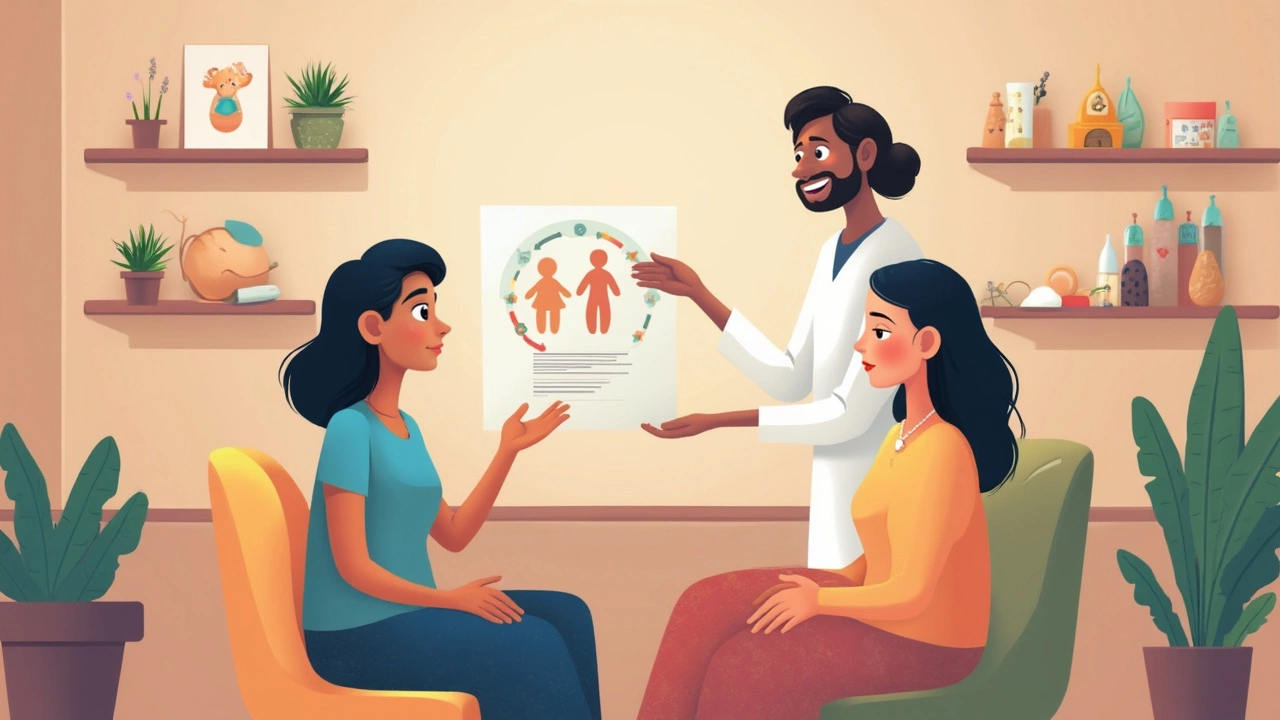
People hear a lot about IVF, but there's one question that comes up again and again: can you actually carry your own baby if you go through IVF? The quick answer is yes, in most cases you do. You're the one who gets pregnant, you go through the nine months, and you give birth just like any other pregnancy. But it can get a bit more complicated, depending on which eggs, sperm, or even uterus are used.
IVF stands for in vitro fertilization. Basically, it's a way to help people have a baby when getting pregnant hasn't been working the natural way. Your doctor takes eggs and sperm, mixes them in the lab, and then puts the embryo back inside the uterus. If all goes well, it attaches, and the pregnancy grows just like any other.
- What Does It Mean to ‘Carry Your Own Baby’ in IVF?
- How IVF Actually Works Step by Step
- Spotlight on Donor Eggs, Sperm, and Embryos
- When Is Surrogacy Needed?
- Choosing the Right Path for You
- Tips and Real-Life Lessons from IVF Parents
What Does It Mean to ‘Carry Your Own Baby’ in IVF?
When people talk about ‘carrying your own baby’ with IVF, they’re asking: after all the lab stuff, will you actually be pregnant and deliver the baby? For most women going through IVF, the answer is yes. After fertilization (egg meeting sperm in the lab), the embryo is put back in your uterus. If it sticks (implants), you get pregnant and carry the baby, just like with any other pregnancy.
This is true whether you use your own eggs and your partner’s sperm, donor sperm, or even donor eggs—unless you use a surrogate (more on that later). Most IVF pregnancies happen with the woman’s own uterus and her own involvement throughout the pregnancy.
Here’s how it usually breaks down:
- IVF with your own eggs and your partner's sperm: You carry your biological baby.
- IVF with donor sperm: You carry the baby; it's your egg but not your partner's sperm.
- IVF with donor egg: You carry the baby, though it's not your egg (genetics come from the donor).
- Surrogacy: Another woman carries the baby, for medical or other reasons.
The big stuff that makes someone the 'carrier' in IVF is who goes through pregnancy and birth. If you’re the one getting the embryo transfer in your body, then you’re the one who carries the pregnancy—even if a donor egg or sperm was used.
Let’s look at how common each option is in real-life data:
| Type of IVF | % of IVF Cases (USA, 2022) |
|---|---|
| Own eggs & own/partner's sperm (you carry) | 60% |
| Donor eggs (you carry) | 18% |
| Donor embryos (you carry) | 6% |
| Gestational surrogacy (someone else carries) | Less than 2% |
So, most women who use IVF are the ones who actually go through the pregnancy. The details of whose egg or sperm was used can vary, but in terms of carrying and delivering, it’s usually you—unless you’re going the surrogacy route.
How IVF Actually Works Step by Step
If you’re looking at IVF for the first time, it’s easy to feel a bit lost. The process is actually pretty clear when you break it down. Here’s what really happens, step by step, from doctor’s visit to embryo transfer.
- Prep and Hormone Shots: First, you’ll go through some tests. If you’re the one providing the eggs, you’ll give yourself daily hormone shots. These make your ovaries grow extra eggs instead of the usual one per cycle.
- Egg Retrieval: After about 10-12 days of shots, doctors check your ovaries by ultrasound. When the eggs are ready, they do a quick minor surgery (under light anesthesia) to remove the eggs. This usually takes less than 30 minutes.
- Sperm Collection: On the same day, sperm is collected. This is usually done by the partner, or with donor sperm if needed.
- Fertilization: In the clinic’s lab, eggs and sperm are put together. Sometimes they just mix them, other times doctors inject a single sperm into an egg.
- Growing Embryos: The fertilized eggs—now called embryos—grow in a warm dish for about 3 to 5 days. Not all eggs will develop, so the lab checks for the healthiest embryos.
- Embryo Transfer: Finally, the best embryo (or sometimes two) is placed into the uterus using a thin tube. No surgery needed, it feels kind of like a Pap smear.
Now, begins “the two-week wait,” where you cross your fingers for a positive pregnancy test.
| Step | Average Success Rate |
|---|---|
| Egg fertilization | 60-70% of mature eggs |
| Embryo implantation | 35-45% per embryo transfer (for women under 35) |
| Live birth after transfer | 27-40% per cycle (varies by age) |
It’s a straightforward timeline from start to finish, but there are a lot of emotions along the way. Don’t be shy about asking your doctor any question, no matter how small—it’s new territory for almost everyone.
Spotlight on Donor Eggs, Sperm, and Embryos
Sometimes, using your own eggs or sperm just isn’t possible in IVF. That’s where donor eggs, sperm, or embryos come in. This might be needed if someone has low egg count, poor sperm quality, or certain genetic conditions they don’t want to pass on. Clinics also help same-sex couples and single parents-to-be using donors.
Here’s what usually happens: if you use a donor egg, it’s fertilized with sperm—yours or from a partner or donor—in the lab. That embryo is then transferred into your uterus (or the uterus of a partner in some cases). So, you still get pregnant, experience every part of pregnancy, and give birth. The big difference? The genetics come from the donor, not from the person carrying the baby.
Similar story with donor sperm. If the sperm isn’t from the intended parent, doctors use a donor’s sperm to fertilize an egg. The resulting embryo still grows inside the intended parent or their partner, but the DNA comes from whoever provided the egg and sperm.
Donor embryos work a bit differently. These are embryos already created by another couple, usually donated because they’ve finished building their family. The embryo is transferred to you, and if everything goes right, you carry and give birth to the baby—even if you share no genetics at all.
Here are key things to know about this option:
- You’ll still have a genuine pregnancy and birth experience, even if the baby’s DNA isn’t yours.
- All donors go through health screening—to look at physical health, family medical history, infectious diseases, and sometimes psychological testing.
- The IVF process itself is nearly the same, no matter whose eggs or sperm are used. The main change is where the genetic material comes from.
- If having a genetic connection matters to you, discuss your feelings and options with your doctor upfront.
A lot of people worry about bonding with a baby from donor eggs, sperm, or embryos, but studies show the bond after birth is just as strong. Your role as the parent starts long before your baby is born.

When Is Surrogacy Needed?
Not everyone who turns to IVF will need a surrogate, but some people just can't carry a pregnancy themselves, no matter how good the science is. Surrogacy comes up when it’s tough or unsafe for someone to get pregnant or carry a baby to term. Here are the main reasons surrogacy is considered:
- No uterus (from birth or removed due to medical problems like cancer or fibroids)
- Serious health issues where pregnancy is dangerous (like severe heart or kidney problems)
- Repeated miscarriages, especially when doctors can’t pinpoint or treat the cause
- Failed IVF cycles where good embryos didn’t implant, and doctors suspect the uterine environment is the issue
These cases aren’t rare—in the U.S., surrogacy is used in about 5% of all IVF cycles according to recent CDC numbers. And it’s not just for women. Gay male couples and single men wanting kids also turn to surrogacy, using their own or donor sperm with a donor egg.
Quick heads-up: surrogacy isn’t the first option given by fertility doctors. Usually, all other avenues are tried first. It’s considered when nothing else works or when pregnancy risks outweigh everything else.
| Reason for Surrogacy | How Often (%) |
|---|---|
| Medical conditions (no uterus, health risks) | ~65% |
| Repeated pregnancy loss | ~20% |
| Implantation failure | ~10% |
| Same-sex couples/single parents | ~5% |
So, if you or your partner can’t carry the pregnancy, surrogacy is the backup plan. There are two types—gestational (where the surrogate isn’t related to the baby) and traditional (where she is), but these days gestational surrogacy is way more common. If you're thinking about it, ask clinics about the medical, legal, and emotional support they offer. It’s a big step and deserves a solid support team.
Choosing the Right Path for You
No two IVF journeys look exactly the same. Your options depend on your medical situation, your age, your partner's fertility, and sometimes just what you feel comfortable with. The main goal? Give you the best shot at carrying a healthy baby.
First, take a close look at what your doctor recommends after checking your hormone levels, egg reserves, sperm quality, and uterus health. If all systems are go, IVF with your own eggs and sperm is usually the first suggestion. That way, you’re carrying your own baby from the very start—just with a little help from science.
If egg quality or quantity is a problem, your doctor might bring up egg donation. Sperm issues? Sperm donation could be part of your plan. If using a donor or even a gestational carrier comes up, it’s not a sign of failure. It’s about finding a reliable way to grow your family.
Most people going through IVF want to make sure they’re as involved as possible in the pregnancy process. Here are a few smart questions to ask before you decide what fits best for you:
- Am I healthy enough to handle pregnancy, or do I need extra support?
- Do I want to use my own eggs and sperm, or am I open to a donor?
- How do I feel about the idea of surrogacy or donor embryos if needed?
- Does my clinic offer emotional support and counseling along the way?
- What will my insurance actually cover, and what extra costs should I expect?
The right path depends on you—and sometimes, decisions happen step by step. If you feel unsure, there’s no harm in pausing to get a second opinion or to talk to a counselor who knows the IVF world inside out. Plenty of couples and singles find their way despite roadblocks. Your plan might even shift along the way, and that’s normal. Being clear on your priorities and asking the tough questions at the start makes everything a little less stressful when choices pop up.
Tips and Real-Life Lessons from IVF Parents
Learning from those who've gone through IVF can make the whole process way less scary. Most parents who did IVF will tell you it’s not just about doctors and science—it’s a real emotional ride, and things don’t always go the way you read online.
One thing everyone agrees on: ask a ton of questions. Clinics can sometimes sound like they’re speaking a different language, so don’t let anything slide. There are no silly questions when it comes to your body or your future kid. Parents say keeping a notebook for jotting down your questions or what the nurse tells you can save you a headache later.
Here are some things parents who've done IVF want you to know:
- Be open about how you feel. It’s normal to feel everything from hope to frustration, sometimes on the same day. Nobody’s IVF journey is exactly the same.
- Get your support system ready early. Whether it’s friends, family, or a support group online, having people to talk to makes a huge difference—especially on days when things don’t go to plan.
- Know that IVF often takes more than one cycle. Success rates aren’t 100%. That’s rough to hear, but being ready for more than one try can help you handle it mentally and financially.
- Understand the meds and side effects. Hormone shots do weird things: mood swings, hot flashes, bloating—you name it. Ask your doctor what’s normal and what’s not.
- Set boundaries if you want privacy. Some people share their journey with everyone, others barely tell a soul. Do what feels right for you, not what you think you “should” do.
A cool thing: lots of parents say the friends they made during IVF stuck around long after the baby was born. Shared struggles like this can create strong bonds. If you’re stressing over things like costs or which clinic is “best,” talk to people who’ve already navigated these choices—they have real-world advice you can’t find in clinic brochures.
At the end of the day, there’s no single right way to do IVF. Parents who’ve been through it say to focus on one step at a time, celebrate little victories, and don’t beat yourself up over things you can’t control. It’s okay to take breaks, switch clinics, or change plans halfway. Going through IVF is tough, but hearing real stories can help you stay grounded and hopeful.





Rohan Talvani
I am a manufacturing expert with over 15 years of experience in streamlining production processes and enhancing operational efficiency. My work often takes me into the technical nitty-gritty of production, but I have a keen interest in writing about medicine in India—an intersection of tradition and modern practices that captivates me. I strive to incorporate innovative approaches in everything I do, whether in my professional role or as an author. My passion for writing about health topics stems from a strong belief in knowledge sharing and its potential to bring about positive changes.
view all postsWrite a comment